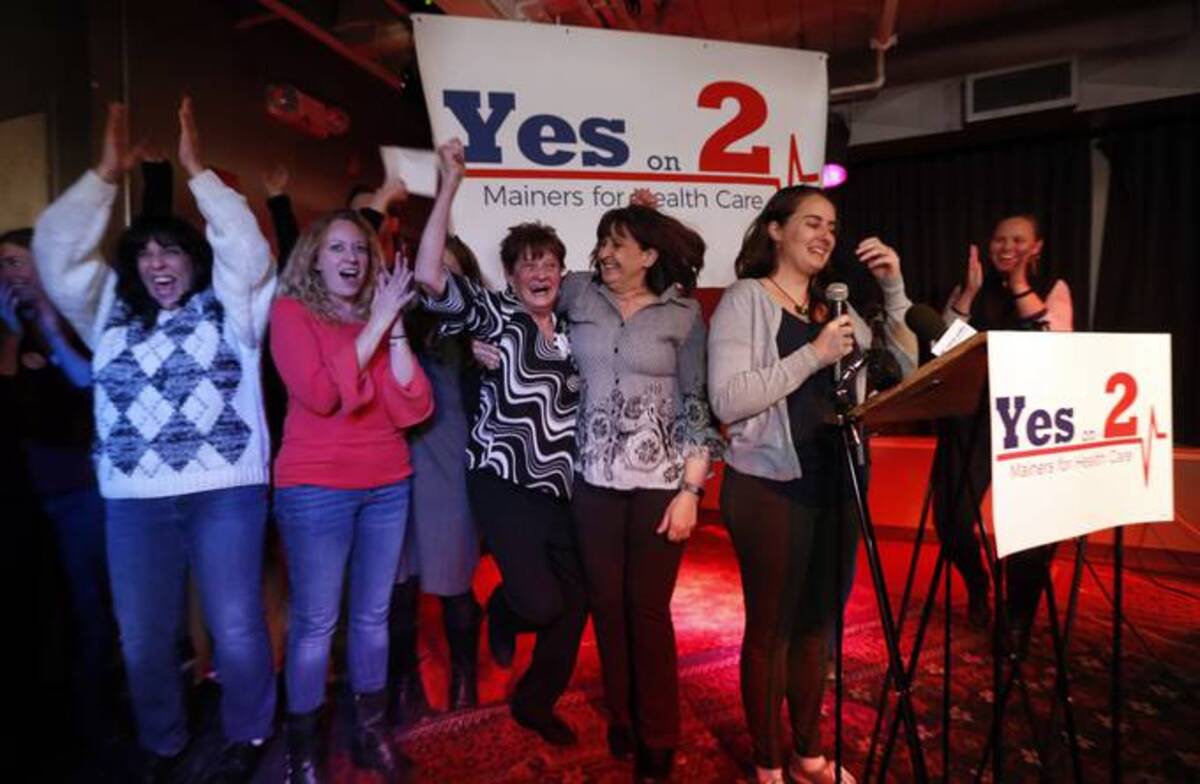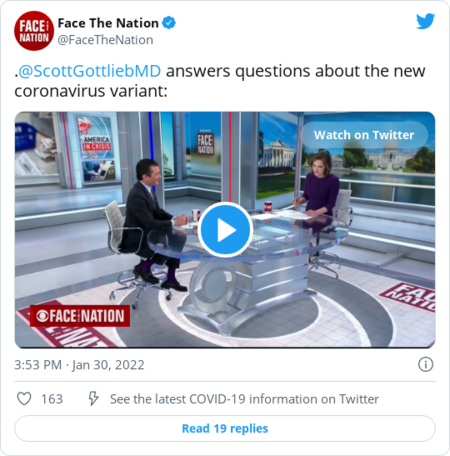| Hey, happy Monday. Today we're raising a mug to those who trekked out in the snow for coffee and donuts. Below: Biden's Medicare agency is looking for new ways to make coronavirus tests more accessible, and early data suggests vaccines protect against a new version of omicron. But first: | South Dakota could become the 39th state to expand Medicaid |  Medicaid expansion supporters in Maine — the first state to put the policy to voters — celebrate their 2017 win. (Robert F. Bukaty/AP) | | | For advocates of Medicaid expansion, all eyes are on South Dakota. Voters there will decide in November whether they want to expand the federal health insurance program to a larger population beyond just the very neediest. But the measure might need 60 percent support to pass instead of just a simple majority – a direct result of GOP efforts to stymie the effort. Republican lawmakers have initiated a June ballot measure to increase the vote requirement for approving ballot measures that 1) raise taxes or 2) require $10 million or more from the state over the next five years. Medicaid expansion would do the latter. | - One high-ranking state senator, who was instrumental in getting the measure on the June ballot, has acknowledged he was motivated by the Medicaid expansion campaign, the Associated Press reports.
- "Is 60 percent a heavier lift than 50 percent plus one? Of course it is," said Zach Marcus, the campaign manager for South Dakotans Decide Healthcare. "But we're confident that Medicaid expansion is a good deal for South Dakota … and we're confident that if we need to get 60 percent of the vote, we will do that."
| | The messaging game: To make their case, advocates say the measure would bring federal taxpayer dollars back to the state, and are also focusing efforts on telling the stories of some of the over 42,000 people who would gain health coverage. On the other side: Gov. Kristi Noem, a Republican, opposes the measure, her spokesperson confirmed. In a recent local radio interview, Noem said she believed taxes would need to be raised to pay for the policy. | | Republican opposition to Medicaid expansion is nothing new. More than 2 million Americans live in GOP-led states that won't expand the program, which was originally included in the 2010 Affordable Care Act but made voluntary for states by the Supreme Court. President Biden's sweeping social spending bill would circumvent GOP officials in the non-expansion holdout states. But Medicaid supporters are still pushing for states to expand Medicaid on their own. That's because the federal proposal would only last through 2025. The benefits may not be as robust as traditional Medicaid coverage. And the overall package remains in jeopardy after Sen. Joe Manchin III (D-W.Va.) said he couldn't vote for it. | - "That's certainly the argument that South Dakotan voters seem to be resonating with because waiting on help from the federal government a) is taking way too long, and b) may not be reliable year over year," said Kelly Hall, executive director of the Fairness Project, an advocacy group that has supported Medicaid ballot initiatives in Republican-led states.
| | Since 2017, advocates have turned to referendums to pass Medicaid expansions in states with intractable GOP opposition. They've never failed, winning six ballot measures, including in deep-red states like Oklahoma and Idaho. Republicans have sought to fight the ballot measures without success. Sometimes it's through dueling messages, like in Oklahoma. Or a refusal to fund the program, like in Missouri. Or a vow to risk jail time before expanding the program without funding, like in Maine. There are only a few states left where a Medicaid expansion measure can be put to voters. Most notable is Florida, which has one of the highest rates of uninsured people in the nation. But it's probably past the point where that's possible this year, given the deadline to collect signatures to place the policy on the ballot, though it could be put to voters another year, Hall said. | - In Mississippi, advocates suspended their campaign last May to put Medicaid expansion to voters. The move came after the state Supreme Court effectively voided the state's ballot initiative process.
| | Wyoming is the session to watch. The effort got further than it ever had during 2021's general session, but faces an uphill battle this year. It's a budget session for state lawmakers, and that means there's a quirk: The policy would need the support of two-thirds of lawmakers in at least one chamber, making it even harder to pass. | - "The outlook is uncertain, and it's just because of that introductory vote," said Nate Martin, the executive director of Better Wyoming, an advocacy group supporting expansion.
| | |  | Agency alert | | | Will Medicare cover at-home tests free? Officials inside Biden's Medicare agency are scrutinizing Medicare law, regulations and operations in an attempt to find a way to make coronavirus tests more accessible for millions of older adults and disabled Americans, our colleagues Amy Goldstein and Christopher Rowland report. The backstory: The Biden administration began requiring private insurers to pay for at-home coronavirus tests earlier this month. But the policy didn't extend to those in the Medicare program, and federal officials have since received a barrage of complaints from lawmakers and advocates. | - "We are looking hard at where there is a path forward," said Meena Seshamani, Medicare director at the Centers for Medicare and Medicaid Services. She declined to predict whether a solution could be found or how quickly that could happen.
| | The fundamental obstacle: The Medicare statute doesn't let the traditional version of the program — which covers nearly 6 in 10 people on Medicare — include over-the-counter health products. | - For the almost 28 million people with private Medicare plans, each company decides whether to cover the at-home tests. The result is a patchwork of approaches.
| | |  | Coronavirus | | | Some potentially reassuring news … Early data indicates that coronavirus vaccines protect against a spinoff of the omicron variant, as health officials seek to learn more information about the sister variant. That's according to data from the U.K. Health Security Agency, Stat's Andrew Joseph reports. | | Known as BA.2, it's a descendant of the transmissible omicron variant. But as with any new variant, there are still questions about its transmissibility, severity and whether it erodes immunity from vaccines or previous infection. | - Last week, the World Health Organization recommended that officials investigate the characteristics of BA.2 to determine whether it poses new challenges.
- How concerned should the country be? "The question is, does this change the decision space? I don't think it does. I don't think it really changes the narrative," Scott Gottlieb, former Food and Drug Administration commissioner, said Sunday on CBS's "Face the Nation."
| | Gottlieb on "Face the Nation": |  | | | | | Spotify breaks its silence: Yesterday the streaming service announced slight changes to its policies around coronavirus content after facing criticism for allowing its creators — particularly, podcaster Joe Rogan — to spread misinformation, The Washington Post's Travis M. Andrews writes. The changes: Publicly posting the company's internal rules for allowable content, "testing ways to highlight" those rules and working to add a content advisory to podcast episodes discussing covid-19. Behind the controversy: Last week rocker Neil Young demanded his music be removed from Spotify in response to "fake information about vaccines," singling out Rogan. Then, several others followed Young's lead. AND ICYMI: The Post's Ariana Eunjung Cha dives into America's split-screen pandemic. She chronicles how many families are resuming their lives as nearby hospitals are overwhelmed. Read her story here. | | |  | In other health news | | - The Labor Department is working to craft a permanent set of coronavirus safety rules for health-care facilities. The efforts could take months, or even years, and include policies like mask-wearing, social distancing and new cleaning procedures, per our colleague Eli Rosenberg.
- Pope Francis said access to accurate, scientific information about the coronavirus is a "human right," our colleagues María Luisa Paúl and Adela Suliman report.
- A suicide hotline shares data with a for-profit spinoff, an arrangement several ethics and privacy experts saw problems with, Alexandra S. Levine writes in Politico.
| | |  | Daybook | | | Tuesday: The Senate HELP Committee is holding a hearing to discuss the federal response to mental health and substance use disorders; stopping covid-19 fraud and price gouging is on tap at a Senate Committee on Commerce, Science and Transportation subcommittee hearing. Wednesday: The House Ways and Means Committee will also home in on mental health in a hearing; a House Energy and Commerce subcommittee will hold a hearing on legislation to stop price gouging in connection with the coronavirus pandemic; a Senate Finance subcommittee will discuss the future of Medicare financing. Thursday: A House Ways and Means Subcommittee will focus on bridging health equity gaps for those with disabilities and chronic conditions. | | |  | Sugar rush | | | Thanks for reading! See y'all tomorrow. | |








No comments:
Post a Comment